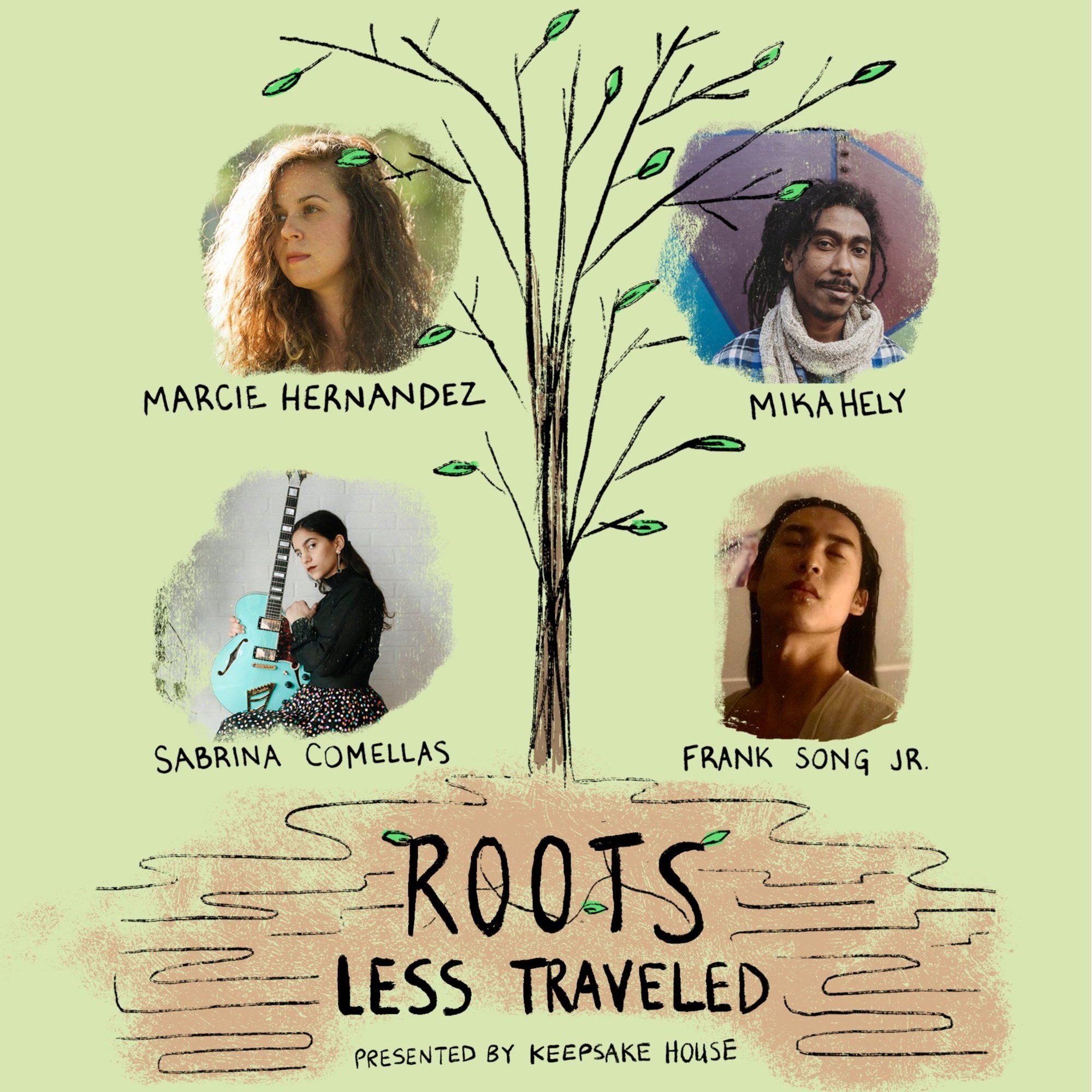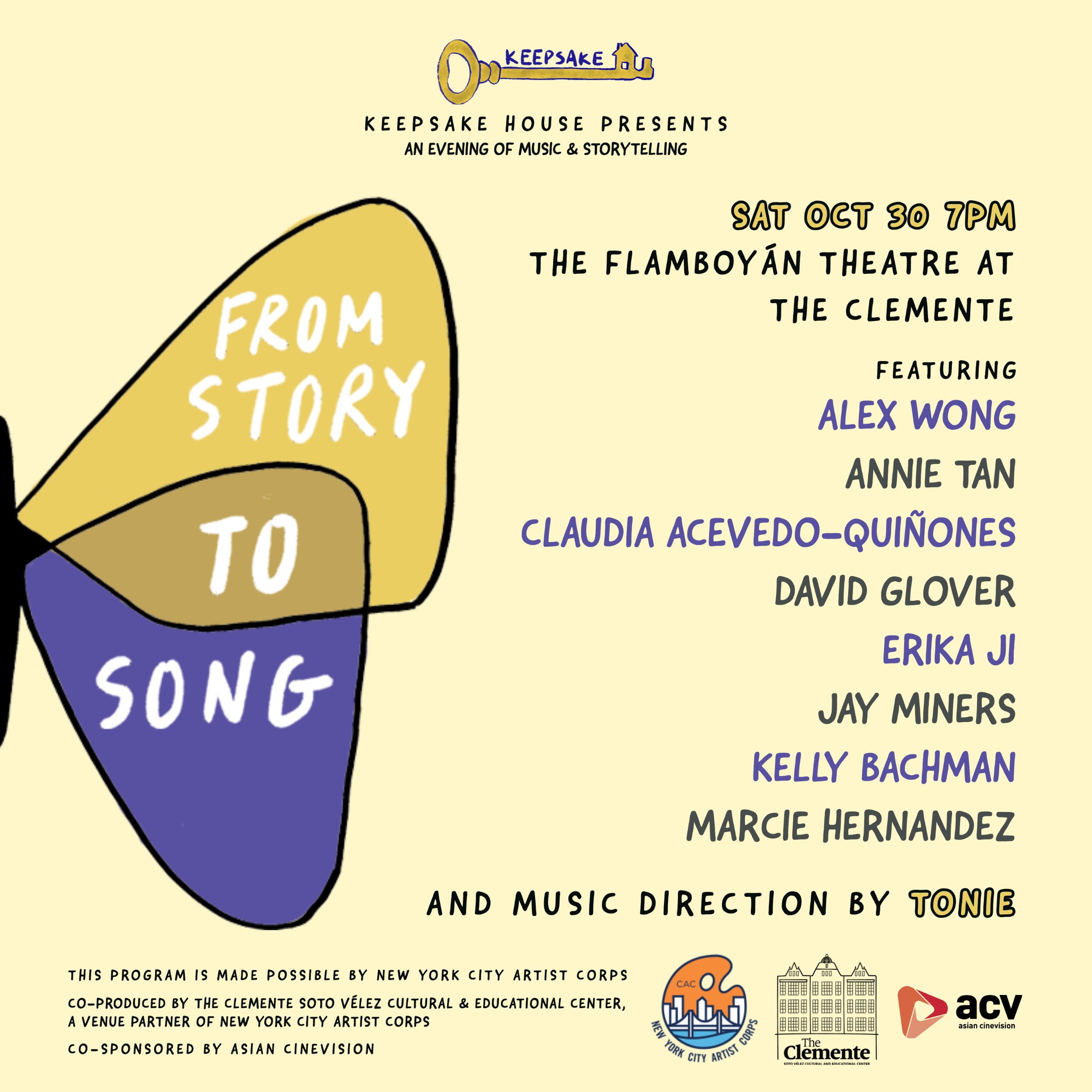Behind More Doors with Marcie Hernandez
Marcie Hernandez is a singer/songwriter based near Montpelier, Vermont who performed in the Keepsake show Roots Less Traveled and will perform in our upcoming show, From Story to Song. Tickets are FREE; RSVP now! In this interview, Marcie returns to chat with Jay and Hailey about visiting New York after eight years away, why she doesn’t take unpaid gigs anymore, and her new music video project.
In this semi-yearly blog series, we post in-depth interviews that take you behind more doors (or #BMD) with independent artists who have already been interviewed for Keepsake House and performed in a Keepsake show. Didn’t read Marcie’s last interview? You can do so here!
Jay & Hailey:
You’ve performed for Keepsake House before, at our show in Vermont called Roots Less Traveled. What was that show like for you? What made you choose to sign on for another, and how would you describe a Keepsake show from a performer’s perspective?
Marcie:
Performing for the Roots Less Traveled show was a very special experience for me because it was my first show in front of a live audience that I could see and interact with since the beginning of the pandemic. Throughout the pandemic, I did many livestream shows, and I even had a live show where I played indoors while the audience watched me perform through a glass window. The Roots Less Traveled Show, though, was my first time back on-stage with other performers and with an audience that I could interact with without any barriers between us. We were gifted with a beautiful evening in the park that night, and the whole experience was incredibly energizing and connective.
“My music always comes from a deeply personal space. With my music, I aim to inspire the human spirit while immersing listeners in a world of multicultural sounds.”
I chose to do another show because my first experience with Keepsake House was so positive and fun! Both [of you], Jay and Hailey, were incredibly well-prepared and made me feel very valued as an artist within their show. From a performer's perspective, being a part of a Keepsake House show feels like being given the opportunity to share your work in an intimate and unique environment that Jay and Hailey work hard to cultivate. I made great new friends among the performers in my last show, and I can't wait to connect with more artists in this upcoming show.
Jay & Hailey:
How would you describe your music to somebody in three sentences or less?
Marcie:
My music always comes from a deeply personal space. With my music, I aim to inspire the human spirit while immersing listeners in a world of multicultural sounds. My music lives in cultural dualities, reflecting my own bi-cultural experience.
Jay & Hailey:
What is the thing you are most known for? What would you like to be most known for?
Marcie:
I suppose at this phase of my career, I am most known for writing songs that cross the boundaries of genres and languages (English and Spanish). I would like to be known as a musician that creates positive and inspiring community around my art.
Jay & Hailey:
You're performing in our upcoming show, From Story to Song, which is a special show for us because of its storytelling and paired artist aspects. What has it been like working with your partnered Storyteller so far and what can you tease about the story you'll be sharing at the show?
Marcie:
It has been such an interesting and reflective experience to get to know my storyteller and learn about her story. I found myself relating very much to the story that she shared with me. The song that I will be sharing will touch upon themes of family roles and dynamics.
Jay & Hailey:
How do you approach the craft of storytelling? How does this process of writing someone else's story differ from writing your own?
Marcie:
This process of writing a custom song to encapsulate someone else's story was a refreshing step away from writing from my own perspective. A difference that I noticed was that my writing was a bit more literal in the lyrical sense because I wanted to be sure that certain themes came across clearly in the song. When I write for myself, my tendency is to be a bit more abstract and open-ended with my lyrics. But in this case, I felt it was important to translate the story in a clear way, as a means of honoring the story. That said, I also tried to leave room for the listener's own interpretation around the meaning of the song.
Jay & Hailey:
You used to live in New York and are returning for this show. How are you feeling about that? Have you missed the city at all?
Marcie:
I am thrilled to be coming back to the city for this show. I haven't really been able to visit since I left, about eight years ago. I'm honestly a little nervous too. After living in rural Vermont for so long, I'm not sure how it will feel to be in a real city again! I've definitely missed certain aspects of living in the city, like the incredible diversity and the overall energy of city living. I also miss the donuts from one of my favorite breakfast spots in Brooklyn; I'm hoping I get to visit them while I'm there!
Jay & Hailey:
This show, and art making in general, require a certain amount of vulnerability. In life and/or work, how do you balance being vulnerable and protecting yourself?
Marcie:
Good question! I feel that there is strength in being vulnerable and opening up; more often than not, I have found that many of us share the same vulnerabilities and insecurities. I think remembering that we share more similarities than differences as humans is helpful for me. I also try to practice a good amount of self-reflection and mindfulness in my life and work. When I am feeling some kind of discomfort or anxiety about something, I try to look at it with curiosity and not be judgmental of my feelings.
Jay & Hailey:
What has been your favorite project you've ever worked on and why? And/or your least favorite?
Marcie:
So far my favorite project that I've worked on was creating the music video for my song, “Light A Torch.” This was my first time putting a visual component to my music, and I loved the opportunity to collaborate with others while adding a deeper dimension to my work as an artist.
Jay & Hailey:
For independent artists, "working" doesn't always equate to being paid or making a profit. Can you tell us more about what that means for you, or independent artists in general?
We learned when we first met you that you are also a working music therapist. How do you balance these careers?
Marcie:
“To require payment for our time and work is a way to maintain dignity in our work. I feel very strongly about artists getting paid for their work, and particularly female and/or BIPOC artists. ”
One of my favorite books on the topic of art and financial success is Real Artists Don't Starve by Jeff Goins. This book inspired me to stop taking gigs that don't pay, simply because they offer an artist "exposure." To require payment for our time and work is a way to maintain dignity in our work. I feel very strongly about artists getting paid for their work, and particularly female and/or BIPOC artists.
That all being said, it is still tough to rely on my music as my main source of income, and so I also have a career as a certified music therapist. I feel my life as a musician and as a music therapist are intertwined on many levels, one often fueling the other. I have always been interested in psychology and in the use of music as a tool for healing and personal development. I feel grateful to be able to combine these different interests in my life.
Jay & Hailey:
Can you share one important thing you've learned about yourself and/or your creative process through your art?
Marcie:
An important thing I've learned about myself through my art is my ability to persevere. Throughout my journey as a musician, I've encountered situations that have required a certain level of patience and perseverance that I hadn't realized I had. I think I've also learned to trust more in the flow of life.
Jay & Hailey:
How did the pandemic affect you and/or your art?
Marcie:
The pandemic certainly brought a new level of uncertainty for all of us. I ended up releasing my debut album in the middle of the pandemic, which obviously wasn't ideal, but it needed to happen. I had to cancel many shows, including my album release show. On the other hand, though, there were some silver linings. Throughout the pandemic, I started doing many more live-streams, which allowed me to connect with distant friends and family who rarely have the chance to see me perform. My parents, who live in a different state, saw me perform more this past year than they have in several past years combined. So, in some ways, the pandemic created opportunities for connection of a different kind.
Jay & Hailey:
Is it safe to say that social justice is a big part of your art? We know from speaking with you last that your music does explore topics of race and culture, for example “Light A Torch” being written about the aftermath of Hurricane Maria, and you mentioned women and BIPOC artists in particular when speaking about how artists’ time should be paid for. In what ways do you hope your art can inspire future movements and conversations?
Marcie:
I'd say that social justice is a big part of my art. Within my songs, I definitely touch on topics around growing up bi-culturally and my Puerto Rican heritage. I hope that my art will inspire others to also speak openly about their racial and cultural backgrounds, and to speak openly about the injustices and oppressive systems that keep BIPOC folks marginalized.
Jay & Hailey:
Other than the Keepsake show, what projects are you working on right now and do you have anything coming up that you'd like to promote? What are the best ways our audiences can support you and your work?
Marcie:
Yes! I am going to be launching a crowdfunding campaign on November 1 to fund a music video trilogy that I'm producing next year. The trilogy, entitled Tres Pedazos, will include videos for three songs off of my album, Amanecer. The best way for people to stay connected to me is by joining my mailing list, which is available on my website. People can also follow me on Facebook and Instagram.
Jay & Hailey:
We’ve asked you this question before, but we’re curious if your answer has changed since May. At Keepsake House, we talk a lot about the magic in live shows and the communities they help create, almost like every live performance is itself a keepsake that you cherish from a whole house of life experiences. Tell us about your most memorable or fulfilling live performance, the one you would grab first in a fire.
Marcie:
One of my most memorable performances happened recently in a small brewery in Waitsfield, Vermont. I've played in breweries before, and I didn't expect the show to be as fulfilling as it turned out to be because often that environment lends to more casual listening from an audience. Usually patrons are there for the food and drinks, and it's a nice bonus to have live music, but you might not be the main focus of their attention. This particular show, however, was quite different. Both the staff and customers were deeply engaged in our set. Folks were attentive and dancing along to the music, and during our set breaks, many folks wanted to connect with me. I even sold out of vinyl records that night. It was great to feel how this audience connected with my music.
Follow Marcie:




